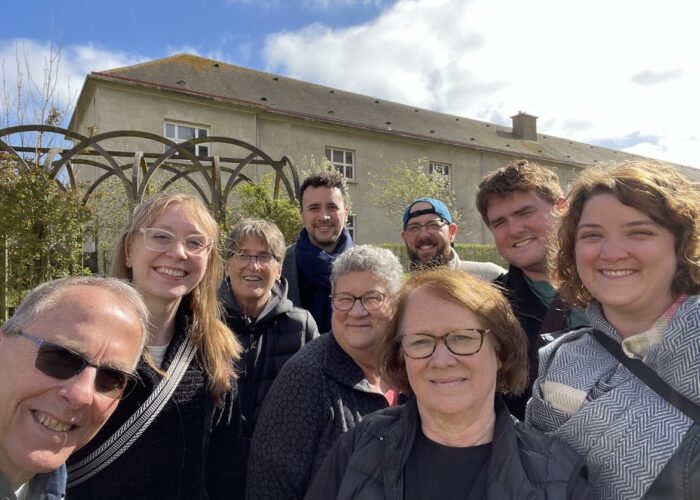This story first appeared on the
Canadian Mennonite website.
In August, Iglesia Cristiana Anabautista Menonita de Ecuador (ICAME) published a statement calling for prayers amid escalating violence in the country.
Alexandra Meneses, who coordinates the Women’s Group and the Discipleship and Liturgy Group at ICAME, explained that the call for prayers and peace followed the assassination of Ecuador’s former leading presidential candidate, Fernando Villavicencio, on August 9.
Speaking by video call from the capital city of Quito, Meneses said that after all the turmoil in the country in recent years, news of the assassination which happened just 11 blocks from their building, pushed the people in her church “overboard.”
“We didn’t know what to do,” she said.
Around the time of Villavicencio’s murder, Reuters reported that Ecuador’s homicide rate had increased by almost 500 percent over the past seven years.
The country saw a sharp increase in gang-related violence at the start of the pandemic, within and outside of its prisons, but Meneses pointed to underlying issues rooted in Ecuador’s adoption of the U.S. dollar as its official currency in 2000. The move created an economic and political crisis.
“The population feels impoverished and abandoned in a state that is not meeting the most basic needs of people,” Meneses said.
She said hospitals and medical facilities are failing to provide adequate care, and an increasing number of children have stopped attending school regularly.
Unemployment rates are also high. All these factors contribute to instability and violence.
Meneses describes a troubling “phenomenon” that has seen the struggles of dollarization compounded by the influx of refugees fleeing troubles in neighbouring Colombia. As Ecuadorians left their disintegrating homeland for the U.S. or Europe, Colombians poured in.
In response to this influx of Colombians, ICAME launched its own refugee assistance program. Mennonite Central Committee has supported this work since 2009. For the past six years, Meneses has served as one of two coordinators of the program. They take in an average of 500 to 600 refugee cases annually, providing psychological counselling, maternity kits, food and other basics, assistance with enrolment in university, and other settlement supports.
It’s a large undertaking for the small congregation. More than half of the members are migrants, many of whom attend for an average of two years before moving on to other countries.
“Sometimes we call ourselves a church in mobility,” said Meneses.
Peter Wigginton is a mission worker in Ecuador with Mennonite Mission Network. He has lived in the country for over eight years. He attends ICAME regularly and works with other Mennonite churches in other parts of the country. (There are two small evangelical Mennonite conferences in Ecuador, though ICAME functions independently of them.)
Wigginton expresses suspicions about what led to Villavicencio’s murder. The former presidential candidate was once a prominent journalist who exposed organized crime groups. He was vocal about targeting these groups during his presidential campaign.
The six people alleged to have been involved in Villavicencio’s murder were from Colombia. All six were murdered in prison on October 6, before court proceedings had been completed.
Villavicencio was murdered about 10 blocks from Wigginton’s house, and 11 blocks from the church, on a sidewalk where Wigginton jogs.
He says that although churches like ICAME in Quito and the northern highlands have not experienced as much violence as those in cities like Guayaquil on the coast, knowledge of violent incidents feels like a weight in his community.
Additionally, the nationality of the men accused of murdering Villavicencio has aggravated xenophobia toward Colombian immigrants, causing concern for ICAME’s refugee program.
Mennonite churches in coastal areas report higher rates of violence. Wigginton learned of friends who were holding a prayer meeting in one of their homes when the sound of gunshots burst out.
Another friend living in a community just outside Guayaquil said he and other members of the local church do not leave their homes unless they absolutely must.
“That just gives you this sense of dread,” said Wigginton.
Both Meneses and Wigginton have an awareness of how current trends in homicide clash with the country’s traditional pacifist identity.
Meneses said that up until the last five or six years, Ecuador was still among the safest Latin American countries. Wigginton explained that pacifism was written into Ecuador’s constitution, so it was relatively simple for ICAME to call itself a peace church.
“But now, responding as a peace church could imply something else,” he said. “Churches have to actually embody that and know deep down what that means.”
Wigginton and his wife and children recently returned to Quito after a three-month trip to the United States to share about their work. They asked the churches they visited to pray that faith communities in Ecuador may find ways to be a Christ-like presence amid violence.
“Do we need a process of realizing where we are situated before we can even respond,” he asked, “or can we just dive into being a Christ-like presence before even knowing what’s going on?”
“Merienda Menonita,” the podcast Wigginton co-hosts, and Mission Network have invited leaders from Colombia and experts from Ecuador to an event in November where they will gather in prayer and work toward a faith-based response to increasing violence.
For her part, Meneses expressed her deep desire that every Mennonite be a seed of peace, referencing Psalm 85:10, which states that “justice and peace have kissed.”




